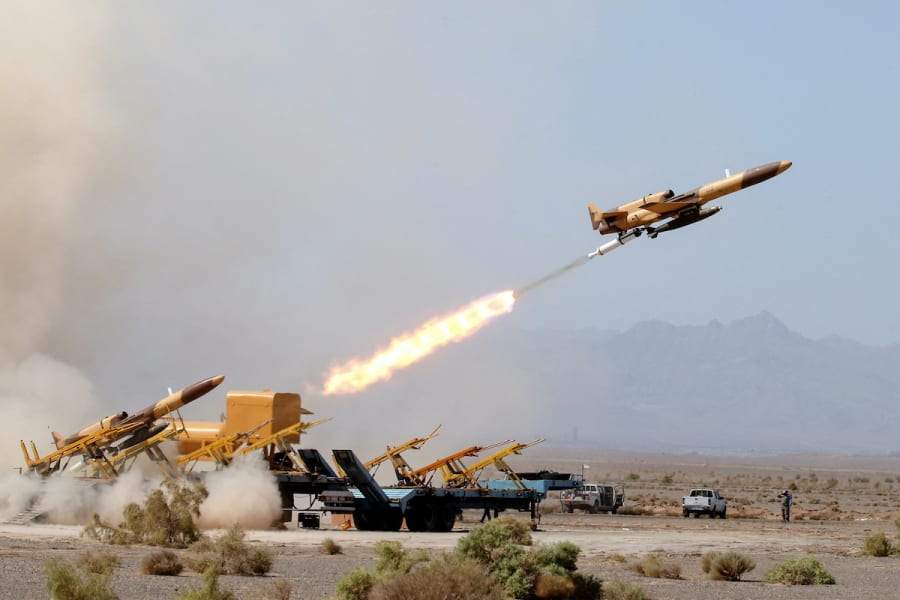Israel providing intelligence to Ukraine on Russia’s Iranian drones
However, Ukrainian officials remain critical of Israel's lack of military support and its policy of appeasement with Russian forces based in Syria

Reports suggest Israel has provided Ukraine with “basic intelligence” on Russia’s Iranian-manufactured drones, a senior Ukrainian official told The New York Times.
The unnamed official also revealed that a private Israeli company provided Ukraine with satellite imagery of Russian troop positions.
In recent years, Iran emerged as a drone-technology power, and has used suicide drones to attack Israeli and Arab targets throughout the Middle East.
According to reports, the Russian military has been deploying the Iranian-produced Shahed-136 suicide drone, in particular, but has had limited success with the drones.
The British Defense Ministry revealed on Wednesday that the drones themselves are vulnerable targets.
“These UAVs are slow and fly at low altitudes, making lone aircraft easy to target using conventional air defenses,” stated the Defense Ministry. At the same time, “there is a real possibility that Russia has achieved some success by attacking with several UAVs at the same time,” the ministry said.
Iranian and Russian officials have denied the usage of Iranian drones in Ukraine, a claim that Ukrainian President Volodymyr Zelenskyy mocked earlier in October.
“People see them in the sky. We shoot them down. But we are told that there are allegedly no Iranian drones in Ukraine. Well, we’ll find ways to ensure that there aren’t any left, indeed,” Zelenskyy said.
With support from Western powers, the Ukrainian military reportedly has already downed some 60% of the Shahed-136 drones used by Russia in Ukraine.
Meanwhile, Ukraine has increasingly sought military assistance from Israel, particularly the Israeli-developed Iron Dome aerial defense system.
“We need Israeli assistance. … I mean that we need the military – technical support; we need an Iron Dome … which will allow us to save our civilian women and children from the shelling of the Russian missiles in our territory,” Ukraine’s Ambassador to Israel Yevgen Korniychuk said in June.
While the Israeli government has increasingly articulated support for Ukraine, after being initially muted in its response to the Russian-Ukrainian war, Jerusalem has been reluctant to translate its statements of support into deliveries of military equipment.
Israel fears doing so could lead to a further deterioration of Russian-Israeli ties and complicate Israel’s military operations against Iranian forces and proxies in Syria, where Moscow largely controls the air space.
In a September interview with the French TV5MONDE channel, the Ukrainian president said he was “shocked” by the lack of Israeli aerial support for Ukraine.
“Israel gave us nothing. Nothing, zero,” Zelenskyy told the French channel. He expressed that he understood Israel’s difficulties in the complex dynamic in Syria. However, the Ukrainian leader did not withhold his disappointment.
“I understand they need to defend their land, but then I got information from my intelligence services that Israel provides [the air defenses] in other countries. They can sell, they can export, which is why I am shocked,” Zelenskyy said.
While Israel has been hesitant to send military aid to Ukraine, it has nevertheless been sending civilian aid to the embattled country. The Jewish state’s aid to Ukraine has included helmets, vests, mine-protection suits, gas masks and HAZMAT filtration systems.
Korniychuk, Ukraine’s ambassador to Israel, expressed frustration with Israel’s unwillingness to provide military assistance to Ukraine.
“Over the past seven months, I’ve been begging Israel to change its policy, and I would be happy for that to happen, but I’m not in a position to make decisions,” Korniychuk told the Israeli news outlet Ynet. “We spoke with [Israeli Prime Minister Yair Lapid] … I don’t know what else needs to happen for Israel to change its policy,” stated the ambassador.
Korniychuk also dismissed Israel's concern about the Russian military presence in Syria, albeit with no comment about Russia’s de facto shared control of the airspace.
“Russia has left a limited number of soldiers there … so, there is no threat from Syria, but [Israeli] politicians always use this motive for not making a decision,” the ambassador said.
Meanwhile, the United States is pressuring its allies, including Israel, to help build air defenses for Ukraine, with U.S. Chairman of the Joint Chiefs of Staff Mark Milley noting the quality of Israel’s defense systems.
“Many countries have Patriot. Many countries have other systems. There’s a whole series of Israeli systems that are quite capable,” he said.

The All Israel News Staff is a team of journalists in Israel.













